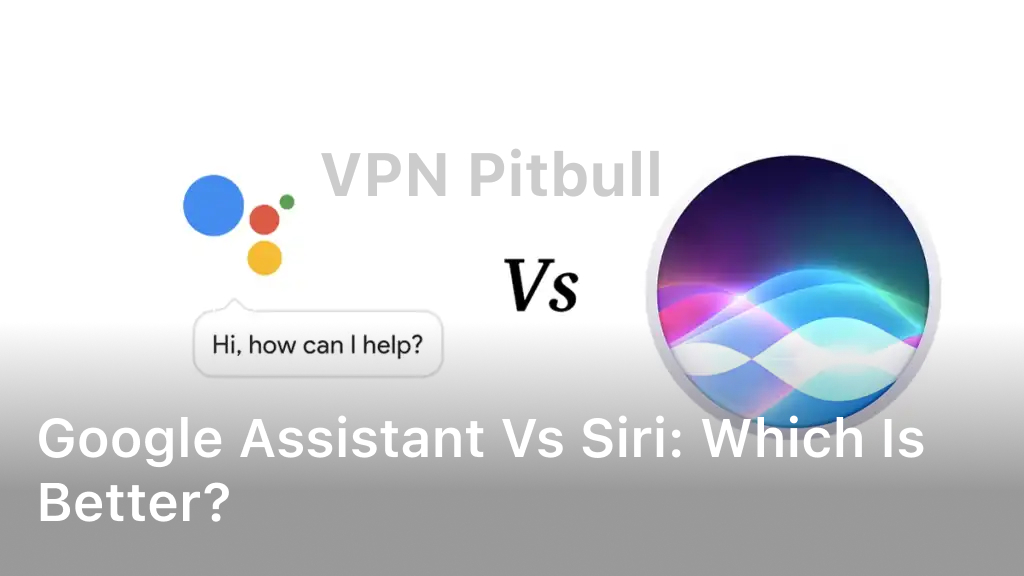Google Assistant vs Siri: Which is Better?
Welcome to our virtual assistant showdown, where we compare two of the most popular AI-powered assistants: Google Assistant and Siri. If you’re looking to buy a new smart speaker or just want to know which personal assistant is better, then you’ve come to the right place. With so many options to choose from, it’s essential to know which one offers the best features and capabilities. In this article, we will explore the strengths and weaknesses of Google Assistant and Siri and help you decide which one is the right choice for you. So, let’s dive in and discover which virtual assistant reigns supreme in the digital world.
Introduction to Google Assistant and Siri

Virtual assistants are becoming increasingly popular, with Google Assistant and Siri being two of the most widely used. Google Assistant, developed by the search engine giant Google, and Siri, created by Apple, are two of the most powerful virtual assistants on the market. They are capable of performing a broad range of tasks, from answering questions to setting reminders, making phone calls, and controlling smart home devices.
Google Assistant is built on Google’s vast knowledge graph, which allows it to deliver personalized results based on a user’s search history and other data. Siri, on the other hand, is designed to integrate seamlessly with Apple’s ecosystem of products and services.
In this section, we will provide an introduction to both Google Assistant and Siri, highlighting their key features and capabilities. By the end, you will have a better understanding of what each virtual assistant offers and which one may be best for your needs.
Features and Capabilities of Google Assistant
Google Assistant is a powerful virtual assistant that provides a wide range of features and capabilities. Its advanced voice recognition and natural language processing abilities enable it to understand and respond to commands in a natural and intuitive way.
One of the key advantages of Google Assistant is its integration with other Google services. Users can easily access their Google Calendar, Gmail, and Google Maps accounts to schedule appointments, send emails, and get directions. Google Assistant can also control compatible smart home devices, including lights, thermostats, and cameras, for added convenience.
Google Assistant also has a wide range of capabilities that make it a versatile tool for everyday use. It can set reminders, make phone calls, send text messages, and play music from a variety of sources. Plus, its ability to answer questions and provide information on a wide range of topics makes it a valuable resource for research and learning.
Overall, Google Assistant’s integration with other Google services, coupled with its natural language processing and versatile capabilities, make it a strong contender in the virtual assistant comparison.
Features and Capabilities of Siri
Siri is a virtual assistant known for its intuitive user experience and tight integration with Apple products and services. Voice recognition is one of its strong suits, enabling a hands-free approach to device control. Its natural language processing enables it to understand complex queries, and it can answer a range of questions.
Integrations
Siri tightly integrates with Apple services such as Apple Music and Apple HomeKit. This allows it to perform various entertainment and home control tasks, such as playing music and adjusting the thermostat, by a simple command.
Task Management
Siri can be used as a personal assistant, helping with everyday tasks. It can send messages, make calls, and create reminders and events on your calendar. It can also provide personalized recommendations, such as suggestions on what to watch on TV or where to eat, based on your preferences.
Advantages
- Intuitive user experience
- Plays well with other Apple products
- Capable task management
Disadvantages
- More limited domain knowledge
- Occasional inconsistencies in performance
Pros and Cons of Google Assistant
Google Assistant offers several advantages as a virtual assistant. Its use of Google’s vast knowledge graph means it can deliver highly personalized results, such as recommendations based on your search history and previous commands. The natural language processing capabilities of Google Assistant are also impressive, allowing for more fluid and intuitive interactions. Additionally, the integration of Google Assistant with other Google services and devices is seamless, providing a more cohesive user experience.
However, Google Assistant does have its limitations. One potential concern is privacy. As with any voice-controlled device, there is the possibility of unintentional recording and data collection. Additionally, while Google Assistant is generally proficient at understanding natural language queries, it can still occasionally misinterpret complex or context-dependent requests.
- Pros:
- Highly personalized results
- Intuitive natural language processing
- Seamless integration with other Google services
- Cons:
- Potential privacy concerns
- Occasional misunderstandings of complex queries
Overall, Google Assistant is a powerful and versatile virtual assistant with several notable advantages. However, users should be aware of its potential limitations and take necessary precautions to protect their privacy.
Pros and Cons of Siri
When it comes to virtual assistant comparison, Siri undoubtedly has its advantages and disadvantages. Let’s take a closer look at the pros and cons of using Siri:
Advantages of Siri:
- Seamless integration with Apple devices
- Intuitive user experience
- Offers personalized recommendations based on user-specific data
- Can provide comprehensive answers to general knowledge questions
- Effortless setting of reminders and alarms.
Disadvantages of Siri:
- Relatively limited domain of knowledge and understanding compared to other assistants
- Occasional inconsistencies in performance
- Privacy concerns
- Sometimes struggles to recognize accents or dialects accurately
- No presence on non-Apple devices.
Overall, Siri is an excellent personal assistant with some fantastic features, but it may not be the best option for those seeking a more comprehensive virtual assistant service.
Conclusion
After comparing Google Assistant and Siri, it’s clear that both virtual assistants have their strengths and weaknesses. Google Assistant has the advantage of leveraging Google’s vast knowledge graph, delivering personalized results, and integrating with other Google services seamlessly. However, it does raise potential privacy concerns, and it occasionally misunderstands complex queries.
On the other hand, Siri offers a more intuitive and personalized experience through its seamless integration with Apple devices. Siri is also better suited for performing tasks such as making calls and sending emails. However, it has a relatively more limited domain of knowledge and sometimes performs inconsistently.
In conclusion, the choice between Google Assistant and Siri ultimately depends on your specific requirements. If you prioritize a smart assistant’s ability to leverage a vast knowledge graph and deliver personalized results, then Google Assistant is the better option. However, if you prioritize seamless integration with Apple devices and an intuitive user experience, then Siri is the way to go. We hope this comparison of Google Assistant and Siri has helped you make an informed decision.
FAQ
Can Google Assistant and Siri be used on any device?
Google Assistant is available on both Android and iOS devices, while Siri is exclusive to Apple devices.
How do Google Assistant and Siri differ in terms of voice recognition?
Google Assistant uses advanced machine learning algorithms to understand various accents and dialects, whereas Siri relies on Apple’s voice recognition technology.
Which virtual assistant is better at providing personalized recommendations?
Google Assistant is known for its ability to deliver highly personalized recommendations based on user preferences and past interactions.
Can Google Assistant and Siri control smart home devices?
Yes, both Google Assistant and Siri are capable of controlling a wide range of smart home devices, providing convenience and automation.
Are there any privacy concerns associated with using Google Assistant or Siri?
While both virtual assistants have privacy measures in place, some users may have concerns about their data being stored and used by these companies.
Can Google Assistant and Siri answer complex questions accurately?
Google Assistant has access to a vast knowledge graph and can typically provide more accurate answers to complex questions compared to Siri.
Is Siri more intuitive to use on Apple devices compared to Google Assistant?
Yes, Siri is designed to seamlessly integrate with Apple devices and provides a user-friendly and intuitive experience for Apple users.
Which virtual assistant is better suited for those heavily reliant on Google services?
Google Assistant is deeply integrated with Google’s suite of services, making it the preferred choice for individuals heavily reliant on Google services.
How does Siri perform in terms of making calls and sending emails?
Siri can make calls, send messages, and emails on Apple devices, offering a seamless communication experience.
In terms of overall performance, which virtual assistant is more consistent?
Google Assistant generally performs consistently due to its sophisticated algorithms and vast data resources, while Siri may occasionally have inconsistencies in performance.




